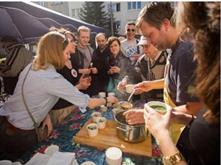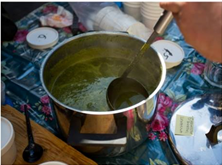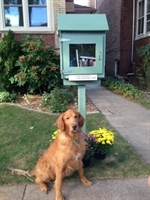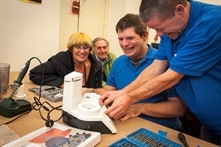
Avers Community Garden
Sharing spaces allows community members to get to know each other better.
 By Kara Riggio and MPC Research Assistant Magdalena Kubecka
By Kara Riggio and MPC Research Assistant Magdalena Kubecka - June 23, 2014
This is the second in our four-post "Old Place New Tricks" blog series. We at the Metropolitan Planning Council hear from community groups that want to make their neighborhood more active and inviting, but don’t know where to begin. This year’s Old Place New Tricks Placemaking challenge was designed to help communities work through the process of creating change, drawing from examples in the U.S. and Europe. You can find the rest of the posts here and learn more about the contest here.
Placemaking can take on many shapes and forms: from designing and building a new plaza to small-scale interventions in parking spaces, people in many communities are coming together to create great places. Small but mighty initiatives including meal sharing, book exchanges and community repair workshops provide a perfect point of entry for Placemaking because they attract people to share in a positive experience (what Placemaking is really all about) and they are simple and free. All based on the act of sharing, there is something inherently magical about them, too.
As many of you reading this know, when planning efforts are led by design, we often end up with places that do not attract people. But when we lead with people and are mindful of the things that people want to do within a space, we can create vibrant places that offer a multitude of opportunities for social interaction. Therefore, the physical space itself is secondary to the social offerings that are available there. The act of sharing can take place within many physical contexts. The following examples explore not the physical context in which the act of sharing takes place, but the mutual benefit that is created through this activity.

Soup Festival in partnership with Kawiarnia Poranna café
Edyta Leszczak
Take a potluck meal among neighbors, for example. Everyone brings food to share and this act of sharing helps connect and integrate communities. That’s how it works with the Moja Narbutta (My Narbutta Street) Soup Festival in Warsaw, Poland. “We started with local street festivals but what we observed was that people were taking part in some activities and leaving soon after. We wanted to keep them and engage them more,” said Alek Tarkowski, one of the organizers. Inspired by the concept of Restaurant Day, Tarkowski notes that “eating is very social thing. And it [brings people together].” Serving food has a strong connotation with hospitality and solicitude. As the Philosophy of Food Project reminds us, sharing meals contributes to improved cultural, psychological and social quality of life.
Tarkowski and his fellow organizers have already learned that bottom-up initiatives are more effective when orchestrated in tandem with local businesses, so they now organize Soup Festival together with a café, Kawiarnia Poranna. The popular location is visible to passersby who see that something exciting is happening on the street. There is also a place for children to play.

Soup Festival in partnership with Kawiarnia Poranna café
Edyta Leszczak
Initiators—those who organize these Placemaking events—often run up against challenges when they invite the public to participate. Sometimes passers-by are suspicious of free soup, for example. Some of them have not previously considered the idea of sharing meals in public space just for fun or to get to know their neighbors. Many people decide to stay and enjoy the experience, but it can be challenging to convince people to participate. Trust and common understanding are vital for working together with the community in public space and Soup Festival has taught us that sharing a soup can be a way to start building toward that goal.
Shared soup is just one way to bring people together. Sharing books is another. Libraries offer a public space in which to do this, but recently, communities across the country are building Little Free Libraries, which provide neighbors the opportunity to exchange books in an informal setting. “Someone mentioned this project during one event in my neighborhood, I liked it and I decided to put one up here in Edgewater,” says initiator Tom Welch, who maintains a Little Free Library location in front of his Edgewater home.
Site selection and partnership are critical components to making this effort a success. Welch’s site is a few blocks from the Thorndale Red Line station and the route most Senn High School students take on their way to school. It’s been a group effort, accomplished in partnerships with local businesses, 48th Ward Alderman Harry Osterman and the Chicago Public Library’s Edgewater location.

The Little Free Library in Edgewater.
Tom Welch
Formal regulations regarding activities in public space often create obstacles to Placemaking initiatives. Coordination of various partners can also be challenging and it’s a good idea to share responsibilities and duties with others. But at the same time, Welch says his work is rewarding when it is visible how this opportunity to share generates incredible energy in the neighborhood. “I see an unbelievable number of people during the day and night exchanging books, so it’s even difficult to track books. It’s amazing the number of people commenting how wonderful that is.”
The Little Free Library in Edgewater started with just one box, but the goal is to build a network in the district. People who take a book from one location would be able to leave it in another one. In addition, the first portable Free Little Library is already at work in Chicago. When walking with a box or a trolley full of books around his neighborhood, Tom can have even more interactions with local community members.

Neighbors work together to repair an appliance.
Martin Waalboer, Repair Café Netherlands Foundation
Apart from soup and books, there are still more things to share. Some residents with unique skills have organized small workshops—places in a lot, outside on the street, in a bar’s nooks—and offer their services to repair others’ broken belongings. In Chicago there is Community Glue, where people can get bikes, furniture or computers repaired by their neighbors at no cost. The initiative is inspired by Repair Cafés. “I was a journalist writing about sustainability and waste prevention. I wanted to do more than write about it,” says Martine Postma, a creator of the Repair Café concept. “So I proposed to people in the city council in my hometown that I would compose a guide on how to produce less waste in daily life. Many of the tips were related to repairing. This is how the idea came to my mind. The first Repair Café was held in October 2009. It became a huge success. Since then, many people wanted to hold their own Repair Café in their own neighborhood.”
The act of sharing—the human interaction and social bonds that are created through that process—is exactly what Placemaking is about. The activities explored here can take place anywhere. They are meaningful and beautiful not because of their aesthetics, but because of the opportunities they create for neighbors and strangers to interact with one another.
Magdalena Kubecka is an anthropologist and a socio-cultural animator. She works as a researcher and a culture manager for non-governmental organizations focused on social development and culture initiatives. Her main fields of interest include urban studies, anthropology of culture, local institutions development and community arts. She is a PhD candidate in sociology at the University of Warsaw. At the moment she is a Kosciuszko Foundation visiting scholar at the University of Chicago Department of Sociology.